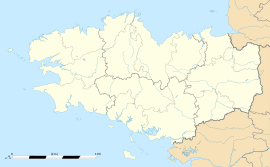Peumerit
Peumerit
Purid | |
|---|---|
 The town hall in Peumerit | |
 Coat of arms | |
show Location of Peumerit | |
 Peumerit | |
| Coordinates: 47°56′22″N 4°18′29″W / 47.9394°N 4.3081°WCoordinates: 47°56′22″N 4°18′29″W / 47.9394°N 4.3081°W | |
| Country | France |
| Region | Brittany |
| Department | Finistère |
| Arrondissement | Quimper |
| Canton | Plonéour-Lanvern |
| Intercommunality | Haut-Pays Bigouden |
| Government | |
| • Mayor (2020–2026) | Jean-Louis Caradec[1] |
| Area 1 | 19.59 km2 (7.56 sq mi) |
| Population (Jan. 2018)[2] | 824 |
| • Density | 42/km2 (110/sq mi) |
| Time zone | UTC+01:00 (CET) |
| • Summer (DST) | UTC+02:00 (CEST) |
| INSEE/Postal code | 29159 /29710 |
| Elevation | 6–127 m (20–417 ft) |
| 1 French Land Register data, which excludes lakes, ponds, glaciers > 1 km2 (0.386 sq mi or 247 acres) and river estuaries. | |
Peumerit (Breton: Purid French pronunciation: [pømʁit]) formerly Peumérit,[3] is a commune in the Finistère department of Brittany in north-western France.
Population[]
Inhabitants of Peumerit are called in French Peumeritois.
History[]
Modern period[]
This municipally is known for facts related to the revolt of "bonnets rouges" traduce, the red caps, in 1675. In 1759, an order from Louis XV order to the parish of Peumerit to provide 20 men and to pay 131 livres for "the annual expense of the coastguard of Britain".
French Revolution[]
The parish of Peumerit, which included 140 fires, elects two delegates, Alain Le Brun and Pierre Canevet, for represent it to the third-state assembly of the seneschal of Quimper, in the spring of 1789.
The 20th Century[]
A political and religious life agitated
The expulsion of the clergy of the Peumerit Parish trains on the 11 March 1909 the decision of M.Duparc to ban all the religious ringtones, even for the Angélus and funerals, a priest installed in the presbytery of Treogat, is charged to visit ills, to proceed at funerals and administer the sacraments.
Breton language[]
The municipality launched a linguistic plan concerning the Breton language through Ya d'ar brezhoneg on 9 June 2006.
See also[]
References[]
- ^ "Répertoire national des élus: les maires". data.gouv.fr, Plateforme ouverte des données publiques françaises (in French). 2 December 2020.
- ^ "Populations légales 2018". INSEE. 28 December 2020.
- ^ Since 1 August 2012, Journal officiel de la République Française, 3 August 2012
External links[]
| Wikimedia Commons has media related to Peumerit. |
- Official website (in French)
- Base Mérimée: Search for heritage in the commune, Ministère français de la Culture. (in French)
- Mayors of Finistère Association (in French)
- Communes of Finistère
- Finistère geography stubs


